Photographs: Courtesy, Rangakuvara/Wikimedia Commons Bhupesh Bhandari
The Real Estate (Regulation and Development) Bill was meant to bring about some order in the sector. But it is yet to become law.
The rule of thumb is that with Rs 10 crore ( Rs 100 million) in your pocket, you can easily launch a project worth Rs 100 crore ( Rs 1 billion).
The Allahabad High Court has ordered the demolition of two high-rises in Supertech Emerald Court in Noida after residents complained the builder had unilaterally raised the towers from 24 floors to 40 floors. Supertech claimed that it had obtained the permission of the Noida Authority for it, but that did not impress the court.
“It has repeatedly come to notice that builders, with officers of development authorities, flout every rule,” it observed. Supertech plans to appeal the decision in a higher court.
...
Tricks that builders use to lure home buyers
In the real estate business, this is an accepted – and tolerated – practice. By increasing the floors midway into construction, which means more apartments, builders get away with under-investing in infrastructure.
In the Emerald Court example, the infrastructure ought to have been for 40 floors; the builder put up one for 24 floors. It is also unfair to the initial buyers.
They had made the purchase assuming they would share the infrastructure with people from 24 floors — they were being made to share it with people from 40 floors.
...
Tricks that builders use to lure home buyers
Photographs: Reuters
If you have tracked real estate in Delhi and its suburbs, you will know this is not an isolated example.
Another builder is known to have had a brainwave and built a school in the middle of his residential complex.
Naturally, the residents are up in arms. Not for nothing did a 2013 survey by Ernst & Young and the Federation of Indian Chambers of Commerce and Industry (Ficci) say infrastructure and real estate were perceived to be the most corrupt sectors of the economy. There was a builder in Delhi not so long ago, big and resourceful. He was infamous for selling the same commercial space to three, even four, buyers.
Then he launched homes for poor people in the city at unbelievably low prices. People queued up in front of his office with cash — probably their lives’ earnings.
The homes never came up; the poor people lost their money. Somebody who worked for this builder told me that there would be two queues in front of the office: one for those who wanted to book flats and another for those who wanted their money back.
...
Tricks that builders use to lure home buyers
Photographs: Punit Paranjpe/Reuters
This state of affairs has a lot to do with the way real estate has evolved in and around Delhi. No builder puts his money upfront into the project.
As soon as he wins land in an auction, he collects his band of brokers and sells the project to them. With that money, he pays for the land.
The brokers, in return, are assured of space at a discount. The rule of thumb is that with Rs 10 crore in your pocket, you can easily launch a project worth Rs 100 crore ( Rs one billion). Since the brokers buy at a discount, the builder over-builds in order to make money.
The extra construction is frequently regularised. Even if it isn’t, nothing stops the builder and brokers from selling it. Often, the builder doesn’t even bother to get a completion certificate.
...
Tricks that builders use to lure home buyers
Photographs: Reuters
Under the law, a builder cannot sell his project unless he has secured all the clearances. These clearances can take up to two years.
Given the high land prices, especially in Gurgaon, no builder can afford to let the investment sit idle for two years. He has no choice but to pre-sell. Then there is speed money for clearances. It adds 10 to 20 per cent to the land cost. And since land accounts for 30 to 50 per cent of the project cost, speed money escalates overall cost by three to 10 per cent.
The builder recovers this money from unsuspecting customers. One way is to add extra floors. There is a demand to simplify the process of clearances, but the bureaucrats don’t want to give up this power. “The time has come when everyone should realise that the rule of law is not purchasable,” the Allahabad High Court said in its verdict on Supertech.
...
Tricks that builders use to lure home buyers
Photographs: Ahmad Masood/Reuters
The law requires all builders to put the money collected from buyers in an escrow account. That money cannot be used for any other purpose.
This rule is openly flouted. Go for a drive in Noida and you will find serial builders: each is constructing at least half a dozen condominiums.
The Uttar Pradesh government in 2008 allowed builders to pay only 10 per cent of the land cost upfront — the rest could be paid in instalments over several years, though with interest. In one stroke, the entry barriers were brought down. Today, there is a glut in the market.
...
Tricks that builders use to lure home buyers
Photographs: Rupak De Chowdhuri/Reuters
As the business is built on turning money around, the slowdown has wreaked havoc. Home buyers watch helplessly as construction at many sites has come to a standstill.
Broker commissions have reached as high as 12 per cent from four per cent two years ago. Many builders have engaged celebrities to endorse their projects.
There are other problems too. The definitions of super area, carpet area, covered area and built-up area are open for interpretation. Builders change these definitions frequently to suit their convenience.
..
Tricks that builders use to lure home buyers
Photographs: Rupak De Chowdhuri/Reuters
The sale-purchase agreements between builders and buyers are a nightmare. For example, most builders now include a clause in the agreement where they promise to pay money to buyers in case there is a delay, but there are escape clauses tucked away in the fine print and projects are delayed with impunity.
There is total opacity on the matter. Brokers too have a free run. Many promise incentives to buyers out of the commission they get from the builder; such money seldom reaches the buyers.
The Real Estate (Regulation and Development) Bill was meant to bring about some order in the sector. But it is yet to become law.

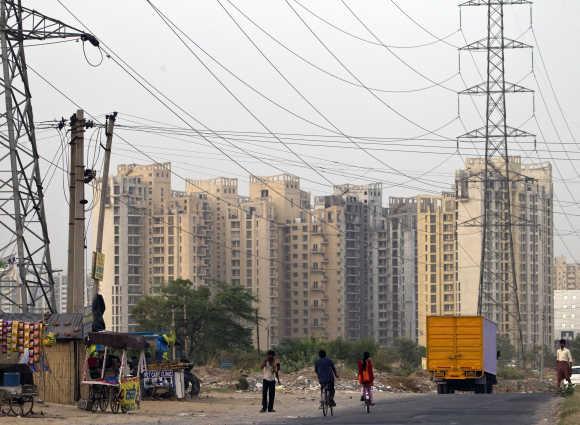

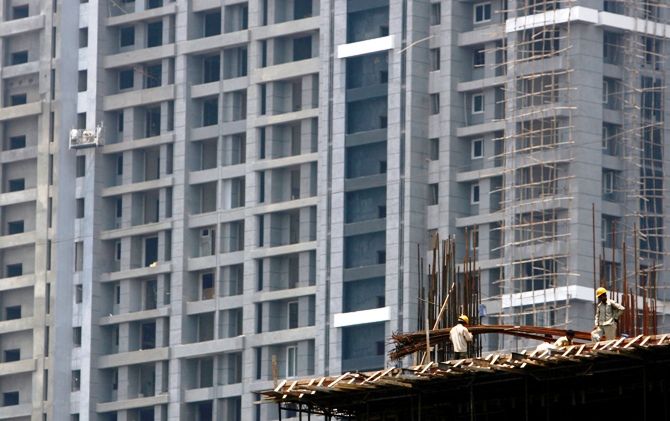
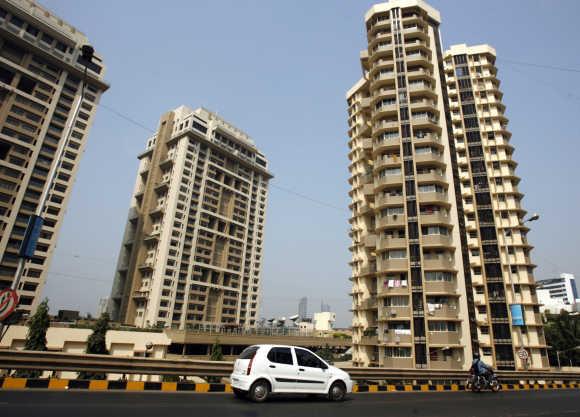

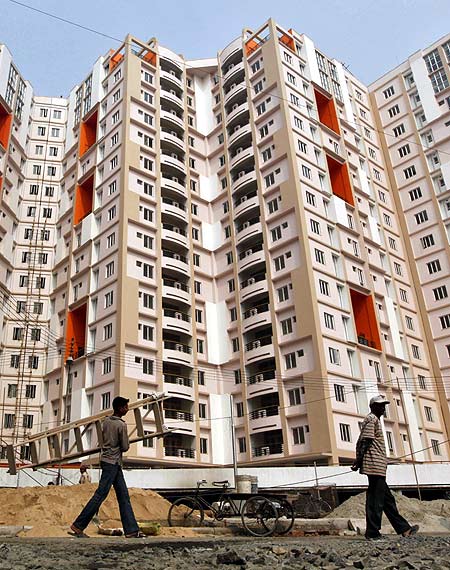
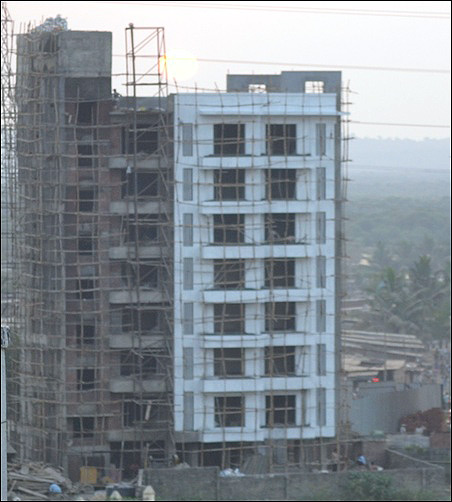

article